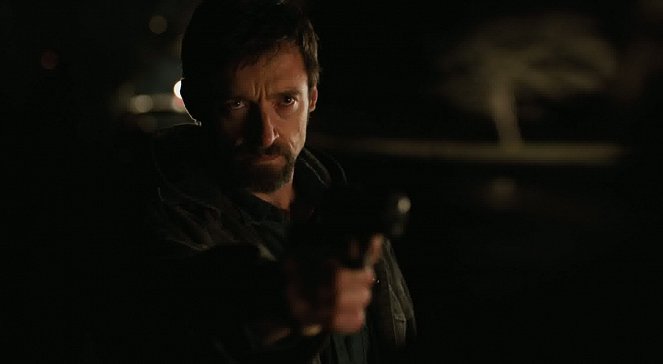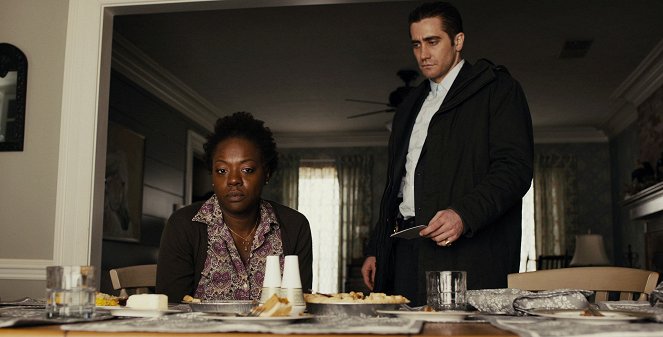Rendező:
Denis VilleneuveForgatókönyvíró:
Aaron GuzikowskiOperatőr:
Roger DeakinsZeneszerző:
Jóhann JóhannssonSzereplők:
Hugh Jackman, Jake Gyllenhaal, Viola Davis, Maria Bello, Terrence Howard, Melissa Leo, Paul Dano, Dylan Minnette, Zoë Soul, Erin Gerasimovich, Kyla-Drew (több)Tartalmak(1)
Milyen messze mennél el, hogy megvédd a családodat? Keller Dover (Hugh Jackman) minden szülő rémálmával néz szembe, mikor 6 éves kislánya, Anna, barátnőjével együtt eltűnik. A kétségbeesés óráiban teljesen eluralkodik a családon a pánik. Az egyetlen nyom egy rozzant lakókocsi, amit az utcájukban láttak parkolni. A nyomozást vezető detektív (Jake Gyllenhaal) letartóztatja a sofőrt, Alex Jonest (Paul Dano), de bizonyítékok hiányában mégis szabadon kell engednie. Az őrjöngő apa tudva, hogy gyermeke élete forog kockán, és a rendőrség egyetlen nyomot követve nem bukkant a kislányokra, úgy dönt, nincs más esélye: kezébe veszi az irányítást, kerüljön bármibe. De vajon egy elszánt apa mire képes, hogy megvédje a számára legfontosabbat? (Pro Video Film)
(több)Videók (5)
Recenziók (15)
A finálé nem ütött ki megfelelően a korábbi mesteri hangulathoz, a fokozódó feszültséghez és a közönség elvárásaival való fantáziadús forgatókönyvírói játékhoz képest. De az utolsó vágás, átmenet a záró feliratokhoz, jó.
()
Exactly the type of film that pulls out all the trump cards in the first third, only to dilute them in vain and uneasily mix them. I was looking forward to a slow psychological crime thriller, but over time it breaks down into a one-string litany, from which protrudes Deakins’ excellent camera and the character of Jake Gyllenhaal, who, unlike the others, has the advantage that you basically don't learn anything about him (at least in this way, it’s a little mysterious). The film also fails significantly as a detective story when it dispenses information very inefficiently and fails to justify its excessive length (one revelation involves a senseless number of repetitive and intense dialogues without a deeper meaning). However, the music, the camera and some of the directing moments away from the plot make it a solid film. EDIT 2020: I take it back, it all works brilliantly as a story of insurmountable anxiety and destructive rage. And in fact as a detective story about a spasmatic detective who patiently faces a feeling of inadequacy.
()
There hasn’t been such a good crime film since Fincher’s Zodiac. It has all the necessary ingredients mixed in a balanced ratio: a perfectly bleak, brooding atmosphere (cinematographer Deakins once again reigns supreme), acting sure-footedness where once again – as in Fincher's masterpiece – I loved Gyllenhaal with his beleaguered police figure, and a perfect screenplay that looks like an adaptation of an ingeniously written novel by one of the Nordic authors who reign supreme in the detective fiction genre today. And on top of that the shit-phile called verbal gave it 1*, so I don't know what better recommendation you'd want :o)
()
An absolutely amazing movie with awesome atmosphere that utilizes its characters, the weather and moods. It completely analyzes the individual details of the situations and the characters themselves. That’s how I like it, and that’s exactly what I get out of American production once every two years, if at all. The first movie I saw that was done with such precision was Seven. That’s exactly what I’ve been thinking of while watching this movie. But I’m sorry that I still can’t give it the full five stars. There were scenes where I needed a deeper explanation. And I don’t think there was any time left for that explanation. It was long enough and if it was just ten minutes longer, I probably wouldn’t have managed. Anyway, Hugh Jackman and Jack Gyllenhaal’s acting was really amazing. They both tuned into the roles so well that I saw all the individual nuances that made it different from ordinary acting performances. Hugh becomes a wreck, and Jack’s face ticks get worse and worse by each passing minute, all the way to the finale. A great movie and precise filmmaking. I wish there were more of those.
()
Prisoners bears the hallmarks of a high-quality psychological drama and a very good crime thriller. However, it ultimately falls short on both genre levels. As a character-focused film, it fails due to the restrained (even in the context of the situations in which the characters find themselves) or, conversely, exceedingly prudent actions of the protagonists. With the exception of Jackman, about whom the hunting prologue tells us most of what’s important, and Gyllenhaal, who adds a peculiar element to his performance with suspiciously frequent blinking (which could indicate that he has a dark past, or that he simply has a facial tick), the actors in the film are dead weight. They do not help with evoking the morally ambivalent feelings that comprise the core of the narrative, as Villeneuve doesn’t bother to better justify their infrequent presence or involve them in the main action. Keller’s wife pays the highest price for the utilitarian handling of the characters. Of all the actors, Maria Bello overacts most aggressively, so we needn’t feel sorry for her as she sometimes wearily and sometimes hysterically staggers her way through the film. ___ The film’s sense of gravitas is apparently supposed to be bolstered by long shots (of tree bark, for example), frequent fade-outs, heavy rain, the use of ambient noise instead of non-diegetic music (which is similarly cacophonous as the aforementioned noise, so – like in Fincher’s The Girl with the Dragon Tattoo – it is sometimes difficult to tell where one ends and the other begins). These are not very original means of evoking a gloomy atmosphere, but they generally serve the purpose. However, Villeneuve overuses them and because of that – among other things – the film fails as a procedural thriller. ___ Shots intended to shape the atmosphere predominate over shots that convey any determinative information. Furthermore, most of the essential revelations are based on unconvincing coincidences rather than on collecting and analysing evidence. The length of the investigation (and thus of the film) is not proportionate to the manner of revealing the perpetrator. At the end, you will come to the most powerful realisation that the whole investigative storyline, with all of its dead ends and ambiguous clues, was designed solely for the purpose of forcing the characters to face certain moral dilemmas so that they would both experience and do something very unpleasant and somehow redeem themselves after staggering out of the labyrinth of (a)morality (this involves one of the many traditional religious motifs that the film works with, along with serpents, crucifixes and Bible quotes). ___ If Villeneuve cared primarily about the psychological level of the narrative, why does he devote so much space to the investigative level, spending most of the film trying to convince us that this is a crime movie after all? The two different levels ultimately weaken each other. Disinterest in the past and deeply rooted motivations of the characters can be accepted in a procedural, but not in a psychological film. Holes in the logic would not matter so much in a psychological study of a person in an extreme situation, but they are distracting in a detective story. Instead of one consistent film, Villeneuve made two films, both of which are thoroughly unsatisfying. 70%
()
(kevesebbet)
(több)



Hirdetés